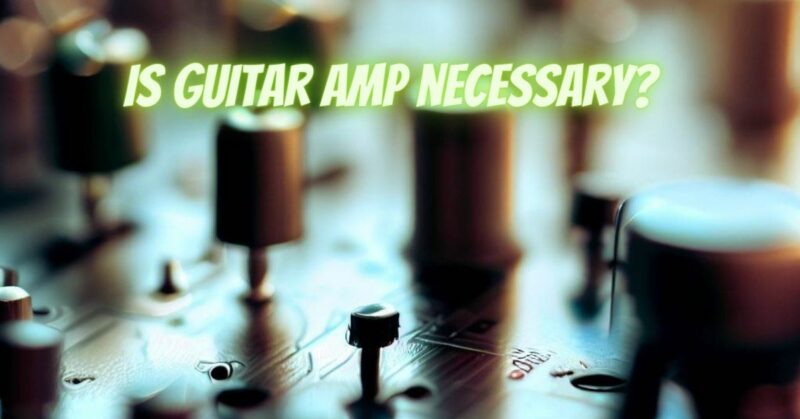The relationship between a guitarist and their amplifier is often considered sacred, embodying the essence of the instrument’s sound and expression. However, in the era of modern technology and digital innovation, the question arises: Is a guitar amplifier truly necessary? In this article, we’ll delve into the significance of a guitar amplifier and explore the factors that influence its necessity in a guitarist’s setup.
The Amplifier’s Purpose:
A guitar amplifier is designed to amplify the signal from an electric guitar’s pickups, shaping and coloring the sound before projecting it through speakers. While its primary function is to make the guitar audible at appropriate volumes, the amplifier also contributes to the overall tone, dynamics, and character of the instrument.
Benefits of a Guitar Amplifier:
- Tonal Shaping: Amplifiers provide a platform to shape your guitar’s sound through tone controls, equalization, and gain adjustments. The amplifier’s circuits can add color and texture, from sparkling cleans to gritty overdrives.
- Dynamic Response: Amplifiers respond to your playing dynamics, enhancing expressiveness. From soft fingerpicking to aggressive strumming, an amplifier captures and translates the nuances of your playing style.
- Volume Versatility: Amplifiers allow you to control the output volume, making them suitable for various settings – from bedroom practice to stage performances. They offer the power to cut through the mix in a band context.
- Live Sound: For live performances, amplifiers play a crucial role in projecting your sound to the audience, ensuring you’re heard clearly.
- Feedback and Sustain: Amplifiers contribute to the natural sustain and resonance of the guitar, a quality cherished by many guitarists.
Factors Influencing Necessity:
- Playing Style: The style of music you play can influence the necessity of an amplifier. Genres like rock, blues, and metal often benefit from the tonal nuances and dynamic response of amplifiers. However, in genres that require pristine clean tones, you might have more flexibility in using amp simulators.
- Home Practice vs. Performance: If you’re primarily practicing at home, you might consider using headphones or small practice amps to keep the noise down. For performances, an amplifier is essential for projecting your sound to the audience.
- Technological Advances: The rise of amp modeling and digital technology has led to the development of highly realistic amp simulations. For some guitarists, these simulations offer a viable alternative to traditional amplifiers.
- Budget and Space: Amplifiers can be costly, and if you’re tight on budget or space, you might need to prioritize other gear. In such cases, alternatives like amp modeling or software plugins can be more practical.
Alternatives to Traditional Amplifiers:
- Amp Modeling: Amp modeling technology replicates the sound of various amplifiers and effects digitally. This allows you to access a wide range of tones using a single device.
- Software Plugins: Software plugins for digital audio workstations (DAWs) offer amp simulations and effects. They’re convenient for recording and production.
- Headphone Amps: These compact devices allow you to play through headphones without disturbing others. They can be useful for practice and late-night playing.
While a guitar amplifier has historically been a staple in a guitarist’s toolkit, the necessity of an amplifier depends on your playing style, performance needs, technological preferences, and budget constraints. Traditional amplifiers offer a tactile and dynamic playing experience, while modern alternatives like amp modeling provide versatility and convenience. Ultimately, the choice between using a traditional amp or exploring digital alternatives is a personal one, and both avenues offer exciting avenues for musical expression.


